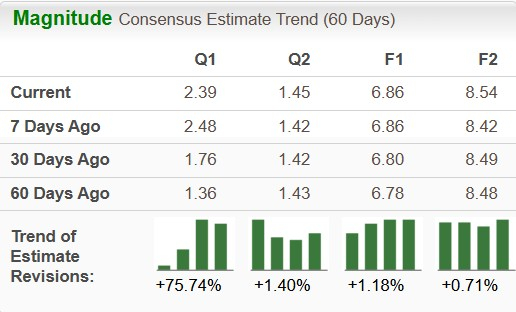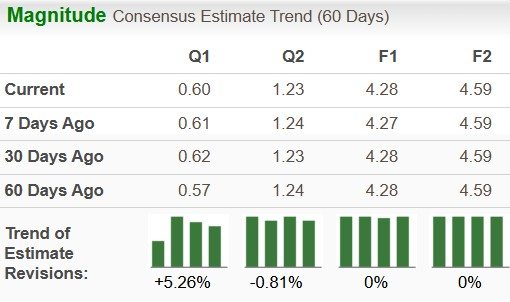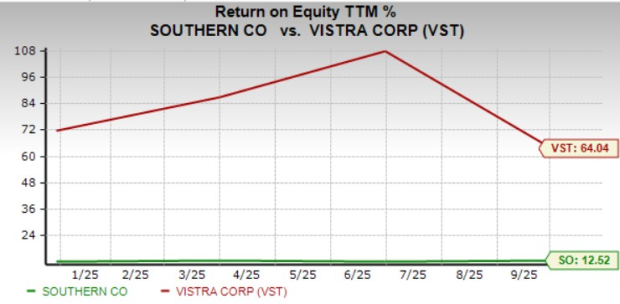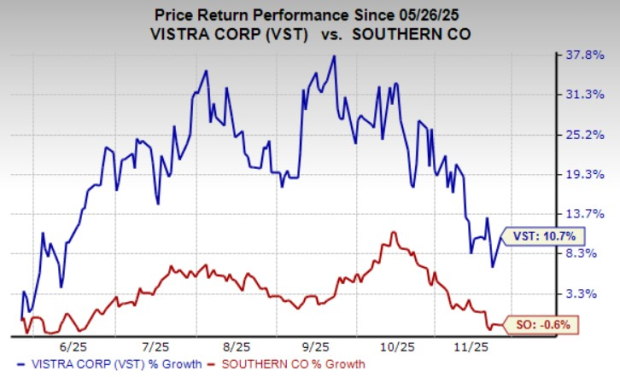|
|
|

|
|||||

|
|
The companies operating in the Zacks Utility -Electric Power industry offer a compelling long-term investment case driven by its highly regulated structure, which provides predictable cash flows and stable returns. Most utilities operate with a domestic focus, benefiting from rate-based growth tied to infrastructure upgrades, grid modernization and reliability improvements. This regulatory oversight helps shield earnings from economic volatility, making the sector attractive for income-oriented and defensive investors.
The utility industry is navigating a major transition toward cleaner energy sources. Utilities are steadily reducing emissions by retiring coal facilities, expanding renewable generation and investing in transmission projects to support wind and solar. Nuclear power is also regaining strategic importance as a reliable, carbon-free baseload resource that complements intermittent renewables. Amid such a backdrop, let us compare Vistra Corp. VST and The Southern Company SO. These prominent U.S. electric utilities are actively investing in renewable energy, making them pivotal players in the shift toward cleaner power generation.
Vistra is rapidly establishing itself as a key force in the nuclear power landscape. The company’s 2023 acquisition of Energy Harbor substantially expanded its nuclear portfolio and paved the way for the launch of Vistra Vision, a subsidiary dedicated to delivering zero-carbon generation. Vistra is also moving forward with clean hydrogen initiatives tied to its nuclear assets, capitalizing on attractive federal tax credits available through the Inflation Reduction Act.
The Southern Company provides dependable long-term value through its regulated utility businesses and targeted investments in cleaner power sources. Supported by a broad generation portfolio, a solid customer base and a favorable regulatory framework, the company maintains steady earnings and consistent dividend growth. The company’s ongoing decarbonization efforts, highlighted by nuclear expansion and increased renewable deployment, have strengthened its position for success in the accelerating energy transition.
As both companies hold strong positions in the utility sector, examining their core fundamentals is essential. A focused comparison can clarify which one presents the more compelling investment opportunity.
The Zacks Consensus Estimate for Vistra’s earnings per share in 2025 and 2026 has increased 1.18% and 0.71%, respectively, in the past 60 days. Long-term (three to five years) earnings growth per share is pegged at 11.67%.

The same for The Southern Company’s 2025 and 2026 earnings per share has remained unchanged in the past 60 days. Long-term earnings growth per share is pegged at 7.23%.

Return on equity (“ROE”) is an essential financial indicator that evaluates a company’s efficiency in generating profits from the equity invested by its shareholders. It demonstrates how well management is utilizing the capital provided to increase earnings and deliver value.
VST’s current ROE is 64.04% compared with SO’s 12.52%. Vistra outperforms the industry’s ROE of 9.64%.

The Zacks Consensus Estimate for Vistra’s sales estimates in 2025 and 2026 reflects year-over-year growth of 18.01% and 29.81%, respectively.
The same for The Southern Company’s sales estimates in 2025 and 2026 reflects year-over-year growth of 8.73% and 4.87%, respectively.
The Zacks Utilities sector is a capital-intensive one, and huge investments are required at regular intervals to upgrade, maintain and expand operations. The usage of new evolving technology also requires investments. Therefore, utilities borrow from the market and add it to their internal cash generation to fund their long-term investments. The decline in interest rate to the 3.75% to 4% range will be beneficial for both utilities.
Vistra’s debt-to-capital currently stands at 75.38% compared with The Southern Company’s 65.34%. Both companies are using higher debt to fund their business, as the industry’s debt-to-capital stands at 59.51%.
The Times Interest Earned Ratio of VST and SO at the end of the previous reported quarter was 2.2 and 2.8, respectively, which indicates both have enough financial capacity to meet their interest obligation without any difficulties.
Vistra currently appears to be trading at a premium compared with The Southern Company on a Price/Earnings Forward 12-month basis. (P/E- F12M).
VST is currently trading at 20.93X, while SO is trading at 19.55X compared with the industry’s 15.27X.
In the past six months, Vistra’s shares have risen 10.7% against The Southern Company’s decline of 0.6%.

Vistra and The Southern Company are investing in strengthening their infrastructure and are focused on adding more clean electricity generation assets to their portfolio.
Based on the above discussion, Vistra currently has a marginal edge over The Southern Company, despite both stocks carrying a Zacks Rank #3 (Hold). VST’s stronger movement in sales and earnings estimates, better ROE and healthier price movement make it a better choice in the utility space.
You can see the complete list of today’s Zacks #1 Rank (Strong Buy) stocks here.
Want the latest recommendations from Zacks Investment Research? Today, you can download 7 Best Stocks for the Next 30 Days. Click to get this free report
This article originally published on Zacks Investment Research (zacks.com).
| 2 hours | |
| 4 hours | |
| Feb-18 | |
| Feb-18 | |
| Feb-18 | |
| Feb-18 | |
| Feb-17 | |
| Feb-17 | |
| Feb-17 | |
| Feb-17 | |
| Feb-16 | |
| Feb-16 | |
| Feb-16 | |
| Feb-15 | |
| Feb-14 |
Join thousands of traders who make more informed decisions with our premium features. Real-time quotes, advanced visualizations, backtesting, and much more.
Learn more about FINVIZ*Elite